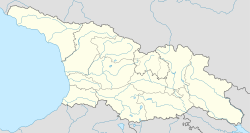Bichvinta
|
Pitsunda ბიჭვინთა (in Georgian) Пиҵунда (in Abkhaz) Bichvinta |
|
|---|---|

The view of Caucasus mountains from Pitsunda cape.
|
|
 Location of Pitsunda |
|
| Location of Pitsunda | |
| Coordinates: 43°10′N 40°20′E / 43.167°N 40.333°ECoordinates: 43°10′N 40°20′E / 43.167°N 40.333°E | |
| Country | Georgia (Abkhazia) |
| Government | |
| • Mayor | Vitali Khutava |
| • Deputy Mayor | Beslan Smyr |
| Climate | Cfa |
Pitsunda or Bichvinta (Georgian: ბიჭვინთა [bitʃʼvintʰɑ]; Abkhaz: Пиҵунда; Russian: Пицунда) is a resort town in Gagra district of Abkhazia.
The town was founded in the 5th century BC as Pityus (Ancient Greek: Pityus, Πιτυοῦς, genitive Pityuntos, Πιτυοῦντος) or Pitiunt, a Greek colony and trade port on the coast of the Kingdom of Lazica. The city was surrounded by a defensive wall, the castellum had a second line of defence built in mid-3rd century AD. Excavations guided by Andria Apakidze unearthed, in 1952, remains of three 4th-century churches and a bath with high-quality mosaic floors. The former "Great Pityus" harbour is now a mere lake within the town.
The Goths attacked the city in 255 CE after taking the Bosporan fleet. The Roman garrison under the command of Successianus repelled the attack, however they returned in the next year, took the city and proceeded further to sack Trebizond.
Saint John Chrysostom was being led towards Pityus by the imperial soldiers, in execution of the decree of exile, when he died on the way in 407. Like Dioskurias, it remained under Roman control within the Georgian kingdom of Colchis until the 7th century. The city passed under Abasgian control and became one of the major political and religious centres of the kingdom of Egrisi (Lazica). An archbishopric of Pitiunt was instituted in 541. In medieval Georgia, the town's name was spelled as Bichvinta. At the end of the 10th century, King Bagrat III of Georgia built there the Pitsunda Cathedral which survives to this day and contains vestiges of wall-painting from the 13th and the 16th centuries. Bichvinta also served as the seat of the Georgian Orthodox Catholicate of Abkhazia until the late 16th century when Abkhazia came under the Ottoman hegemony within Georgia. In his 1911 article for the Catholic Encyclopedia, Sophrone Pétridès described Pityus as a titular see, but it is not now found in the Catholic Church's list of such sees. In the late 13th century, the area housed a short-lived Genoese trade colony called Pezonda.
...
Wikipedia

